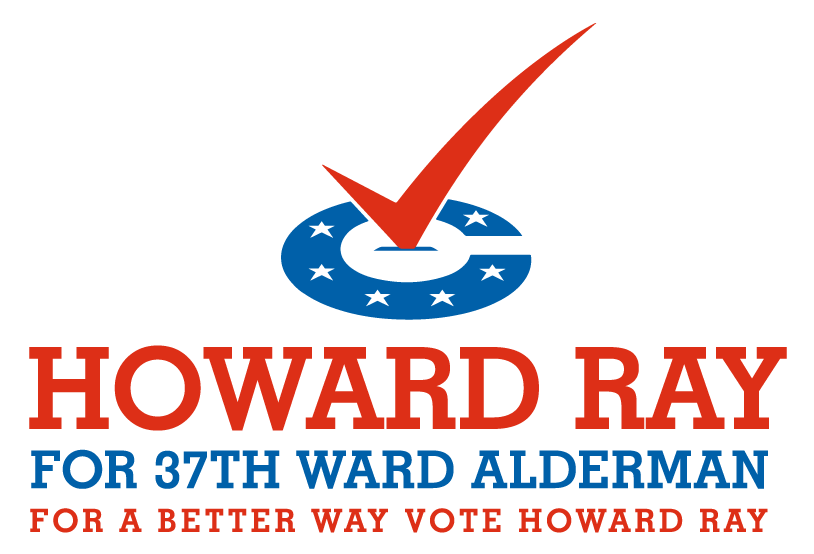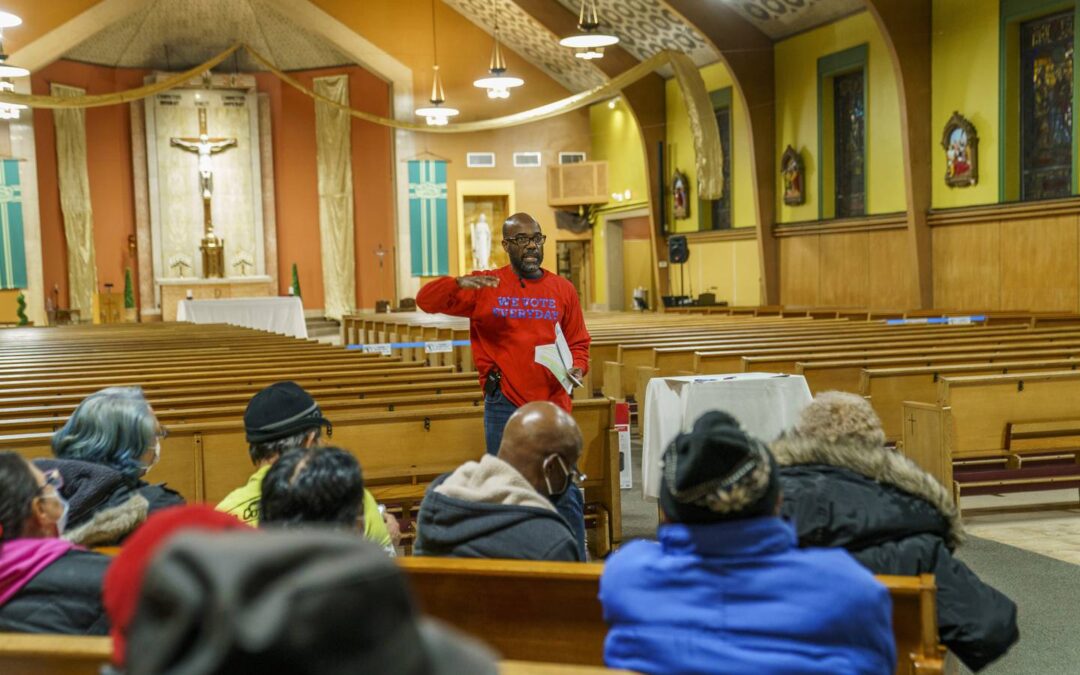Before a new Amazon distribution center opens its doors in West Humboldt Park, a group of residents wants the world’s richest man to agree to share the wealth with the struggling West Side community. Just hours before the group’s most recent meeting, Amazon founder Jeff Bezos had announced a $100 million donation to the Obama Foundation.
Bezos’ recent foray into space travel was also a frequent topic of conversation among those gathered inside the San Jose Sanchez del Rio Catholic Church on North Kostner Avenue on a recent Monday.
:quality(70)/cloudfront-us-east-1.images.arcpublishing.com/tronc/3JOQHV4G6RGOBFH7DW6D564244.jpg)
The church meeting was a call to action for residents to bring their friends and neighbors into a plan to keep the neighborhood affordable.
The city building department has issued construction permits for the distribution center to be built on the 26-acre site of the old Allied Metals facility at 1260 N. Kostner Ave. Early plans had the 140,000 square foot campus opening in late 2022.
Howard Ray Jr., a resident and property owner, and a network of friends and fellow street-level activists that include his dad, are hoping to gain support for a community benefit agreement — a written deal between communities and developers who agree to provide specific benefits in exchange for community support.
Among Ray’s proposals were calls to hire 60% of workers from the surrounding neighborhood, a starting wage of $28.50 an hour, the building of a community center and a special arrangement where Amazon would cover residential property taxes similar to revenue-sharing programs some suburbs like Rosemont have for their homeowners.
“We’re not here to say that we don’t want to have it here. We are here to say we want to be partners, and we want certain benefits,” Ray told residents. “And if you can’t have those benefits, you don’t need it here.”
But experts say reaching such a deal with the e-commerce giant could be an uphill climb, as Amazon has been highly resistant to CBA agreements in the past, even canceling planned projects.
:quality(70)/cloudfront-us-east-1.images.arcpublishing.com/tronc/IY67EUXL4NC2DKQRPD4734Z6HI.jpg)
:quality(70)/cloudfront-us-east-1.images.arcpublishing.com/tronc/V6TJIJB3GBAUHNFIIDQ2X4D7BA.jpg)
Ben Beach, legal director at PowerSwitch Action — a nonprofit that works with communities nationwide to create such pacts — pointed to Amazon’s successful efforts to repeal Seattle’s head tax on large employers, which would have been used to fund the city’s homeless services.
Still, Beach said CBAs can be effective in guaranteeing some benefit to residents. “The CBA is a good tool because it is a binding contract and puts the community in a position to actually ensure that the benefits that they’ve been promised arrive,” he told the Tribune.
Amazon has been on a spending spree in the Chicago area, opening at least 10 distribution centers across the city and suburbs, as well as its recent $35 million purchase of the sprawling Central Steel & Wire plant in Gage Park.
But some have complained about tough working conditions for Amazon employees and worsening air quality brought on by high truck traffic.
CBAs gained public notice when residents in Woodlawn on the South Side fought for a CBA to prevent displacement brought by the Obama Presidential Center.
Fears of soaring rents and property taxes for longtime residents in West Humboldt Park, a small, densely populated neighborhood with industrial pockets, have grown in recent years as communities to the east have been remade following the completion of the Bloomingdale Trail.
Since its 2015 opening, the picturesque 2.7-mile linear park called The 606, built atop an old railroad bed, has brought with it major construction projects that have given a new face to parallel stretches of Bucktown, Logan Square and Humboldt Park.
West Humboldt Park sits at the western end of the trail and represents the last portion untouched by progress. A short distance away from the Amazon space, the IBT Group is in the process of building what they call a creative office campus.
Meanwhile, the greater Humboldt Park community lost nearly 7,000 Black residents during the last decade as the area has become more white and affluent.
“These big businesses are going to come and when they come, it’s going to raise our taxes,” Ray said. “With the taxes raised, it’s going to eventually move out people who’ve been here for 25 years or more. They’re going to be uprooted.”
:quality(70)/cloudfront-us-east-1.images.arcpublishing.com/tronc/HFAAABUX65BAFLGDUH7YKQ66BM.jpg)
During the roughly two-hour meeting, the diverse, mostly older group of listeners vented their skepticism of Amazon, while others shared salty words for the local alderman, whom they accused of keeping them in the dark about the project’s progression. A groundbreaking took place in early November without any notice, according to some residents. Ald. Emma Mitts, 37th, has held community meetings in the past to update residents.
“In Oak Park, Downers Grove, they send out letters to the community where the people stay. You just don’t open up a business without residents having input,” attendee Carmen Graves told at least 30 residents and organizers, her voice raised to fill the church’s interior. “We’ve got to get the mayor involved, because we’re tired of being treated any type of way.”
Resident Richard Vargas, who lives close to the site of the new distribution center and attended the meeting with his wife, said he’s learned more about the project from the traffic near his home than from any official channels.
“I live right where they’re building it, and I see the things that they’re doing. It’s very messy, the trucks come through,” he said. “What bothers me the most is where an organization or entity is coming to the community and not talking to the community.
“The community should know what’s happening. (Amazon) should be working with the community. They feel like they can come in because no one is going to say anything and it’s sad when you have that way of thinking,” Vargas said.
Madeleine Hannes, a graphic designer who moved to the neighborhood three years ago, attended the meeting with her husband to hear Ray’s pitch and inquire about the impact of the center on the community.
:quality(70)/cloudfront-us-east-1.images.arcpublishing.com/tronc/JAWAIYPDO5C5FNZYD5KFUAFP6A.jpg)
“I have really mixed feelings about it. I personally avoid purchasing anything from Amazon because I don’t believe they treat their workers fairly,” Hannes said. ““The West Side has been neglected as far as resources allocated to it, meaning that good-paying jobs for my neighbors are hard to come by. Is there an opportunity there?”
Officials from Amazon couldn’t be reached for comment.
In a statement, Mitts said she supports Amazon’s arrival, calling the addition of 500 jobs essential to revitalization efforts.
“We are focused on expanding our major commercial business corridors, as well as building proactive public-private relationships within the 37th Ward,” Mitts said in the statement. “Amazon is making a major stake in Chicago, and I believe their entrance into the West Side of Chicago is a good thing.”
Mitts didn’t say whether she would be open to a CBA but said she supports “productive engagements with business and community leaders to learn and collaborate with each other and discuss ways to better understand the challenges and opportunities, as we always have — to keep our neighborhoods area strong, welcoming, and vibrant for everyone.”
Beach said CBA contracts are increasingly becoming a common way for communities hosting business to reap rewards and counteract any ill effects but cautioned that they can require deep community involvement. He added that while the revenue-sharing idea wasn’t as common, there was precedent for companies to make payments to communities in lieu of taxes.
“Strong, effective CBAs do take some work,” he said. “They take good organizing within the community to bring forward and articulate needs and demands and they take some work to ensure that the ultimate agreement actually captures what the community needs and demands.”
Organizers said they believe their plan will gain broader community support for a CBA as the word spreads.
“We want Amazon to be fair with us. And how do you do that?” Howard Ray Sr. asked the group. “You hold them accountable.”

